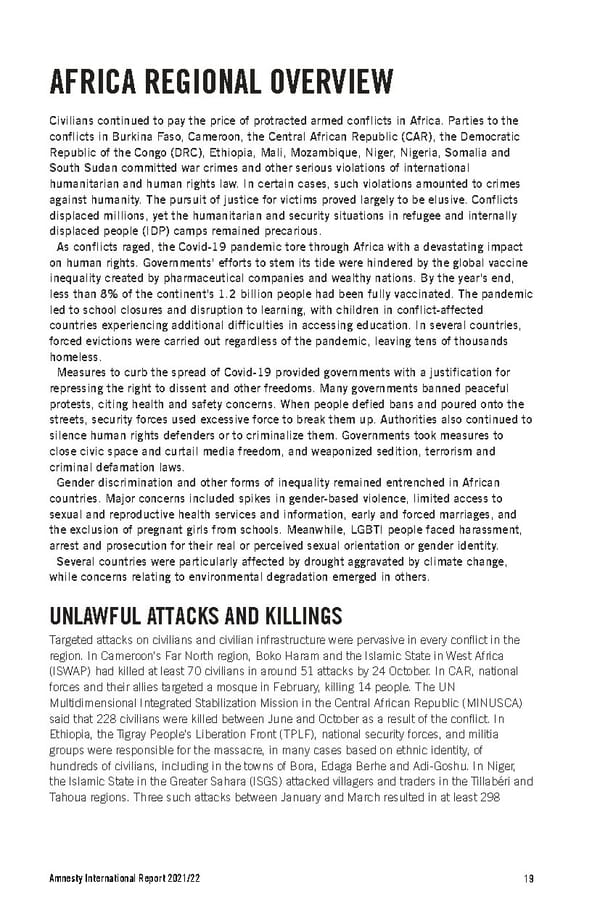AFRICA REGIONAL OVERVIEW Civilians continued to pay the price of protracted armed conflicts in Africa. Parties to the conflicts in Burkina Faso, Cameroon, the Central African Republic (CAR), the Democratic Republic of the Congo (DRC), Ethiopia, Mali, Mozambique, Niger, Nigeria, Somalia and South Sudan committed war crimes and other serious violations of international humanitarian and human rights law. In certain cases, such violations amounted to crimes against humanity. The pursuit of justice for victims proved largely to be elusive. Conflicts displaced millions, yet the humanitarian and security situations in refugee and internally displaced people (IDP) camps remained precarious. As conflicts raged, the Covid-19 pandemic tore through Africa with a devastating impact on human rights. Governments’ efforts to stem its tide were hindered by the global vaccine inequality created by pharmaceutical companies and wealthy nations. By the year’s end, less than 8% of the continent’s 1.2 billion people had been fully vaccinated. The pandemic led to school closures and disruption to learning, with children in conflict-affected countries experiencing additional difficulties in accessing education. In several countries, forced evictions were carried out regardless of the pandemic, leaving tens of thousands homeless. Measures to curb the spread of Covid-19 provided governments with a justification for repressing the right to dissent and other freedoms. Many governments banned peaceful protests, citing health and safety concerns. When people defied bans and poured onto the streets, security forces used excessive force to break them up. Authorities also continued to silence human rights defenders or to criminalize them. Governments took measures to close civic space and curtail media freedom, and weaponized sedition, terrorism and criminal defamation laws. Gender discrimination and other forms of inequality remained entrenched in African countries. Major concerns included spikes in gender-based violence, limited access to sexual and reproductive health services and information, early and forced marriages, and the exclusion of pregnant girls from schools. Meanwhile, LGBTI people faced harassment, arrest and prosecution for their real or perceived sexual orientation or gender identity. Several countries were particularly affected by drought aggravated by climate change, while concerns relating to environmental degradation emerged in others. UNLAWFUL ATTACKS AND KILLINGS Targeted attacks on civilians and civilian infrastructure were pervasive in every conflict in the region. In Cameroon’s Far North region, Boko Haram and the Islamic State in West Africa (ISWAP) had killed at least 70 civilians in around 51 attacks by 24 October. In CAR, national forces and their allies targeted a mosque in February, killing 14 people. The UN Multidimensional Integrated Stabilization Mission in the Central African Republic (MINUSCA) said that 228 civilians were killed between June and October as a result of the conflict. In Ethiopia, the Tigray People’s Liberation Front (TPLF), national security forces, and militia groups were responsible for the massacre, in many cases based on ethnic identity, of hundreds of civilians, including in the towns of Bora, Edaga Berhe and Adi-Goshu. In Niger, the Islamic State in the Greater Sahara (ISGS) attacked villagers and traders in the Tillabéri and Tahoua regions. Three such attacks between January and March resulted in at least 298 Amnesty International Report 2021/22 19
 Amnesty International Report 2021/22 Page 18 Page 20
Amnesty International Report 2021/22 Page 18 Page 20